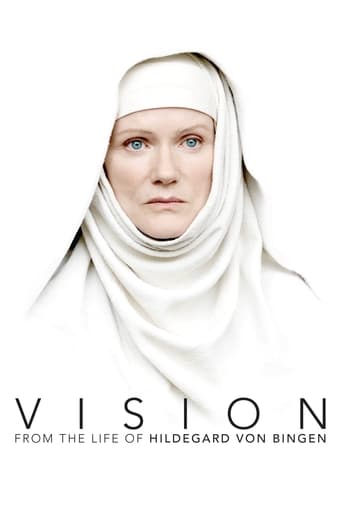Julie Ann Brown
The film is named Vision. It is very appropriate as the music that weaves the visuals to greater experiences by the viewer is from the CD of Hildegard's music by Richard Souther called by the same name, Vision. music) both stir the soul of her demographic to height upon height. Well done German filmmakers!!! The film was visually stunning. It is difficult to tell the tale of the most powerful female in Western Culture and do it in a universal manner. It is obvious that this film had a team that had their own Vision to do more than make a film, but create a digital film footprint of a globally known and loved academic, spiritual, and feminist historical icon and mentor.
Armand
I am Orthodox and the lives of Catholic saints are , for me,not more than nice episodes from good people existence. not the visions, not stigmata, not crumbs of piety are arguments for their sainthood. so, this movie was a source of delight. because it is tale of a woman. a real woman, far from aura or perfect gestures. a woman of a time. a victim and a conquerer. with falls and victories. a honest portrait, not very credible but honest ,about a human been in search of Truth. front against temptations. almost prey of them. sketch of Rennaiseance , she is a revolutionary and her fight fruit of strange visions. the central ingredient - images. the sweet part - exaggerations. many and amusing.but intention to give a not pink/fake portrait is good thing. and so, poor Hildegard has a honest portrait.
filmalamosa
The movie follows the life of Hildegard Von Bingen a famous medieval nun/magistra/convent founder who had religious visions and was interested in science, music, medicine, and much more...The cinematography was absolutely beautiful and the story captivated me even with its modern feminist sensibilities every where....from the suitably milque toast priest Volmar to her renaissance passion for all intellectual pursuits....The cliché over veneration of books learning etc comes off as nerdy and dumb when exaggerated too much as it was in this movie. That said I wish I had read up on Hildegard before watching; there was apparently much substance to the woman--the movie fails here..having her oohing and aawing over stacks of books or staging an avant garde (for the era) play doesn't do her credit.The part of her that captivated me of course were the visions. Everyone hopes things like that are not mental illness. You grow to really like this woman and that is the key to good cinema no?The character of Richardis is good too...more than a hint of female homosexuality that was sublimated by both parties.This movie would have been a 10 if the visions had been shown better and the pseudo intellectual nerd and feminist stuff toned down.RECOMMEND
wj2007
This movie was a disappointment. The viewer coming to the film without a knowledge of who Hildegard of Bingen was and her significance is likely to leave the movie in almost the same condition. Why nine hundred years after her life is she still discussed? This movie will not answer that question.The plot is minimal and predictable. It tells the story of Hildegard's becoming a nun, becoming the head of her group of sisters, starting her own nunnery, her conflicts with male authorities, and her relations with political authorities. At least as presented in Vision, this is not riveting. Neither the photography nor the acting is very impressive.While the movie alludes to Hildegard's musical works, her scientific and medical interests, and devotes time to her visions, we do not receive a coherent well developed picture of the woman and her accomplishments. And that is a disappointment since Hildegard was an interesting person.In short, Hildegard the person simply is not the same as Vision the movie. A movie reviewer ought not confuse the two.To cite just two points on which a more enterprising film might have focused:(1) For all of the movie's talk of Hildegard's visions, no effort is made to present them visually. That could have been quite dramatic cinema. Even if the budget constrained dramatic staging of the visions, a skillful writer would have used a plot device (such as manuscript illuminations or wall paintings) for graphic effect. It would have provided us with some feel as to their power and impact on her contemporaries. Alas, instead the movie has Hildegard narrating small disconnected passages without any real vitality.(2) The movie ends just as Hildegard is going out to preach. She made four such trips and apparently they had major impacts throughout the Rhineland. Yet we do not see those trips. Undoubtedly they could have been presented in very dramatic fashion. Alas again, the movie misses a great cinematic opportunity.One final point before closing. Yes, Hildegard is a strong woman resisting domination by male Church leaders, a creative artist, and an interesting intellectual figure. Unfortunately her legacy is not wholly uncontroversial. Some of her visions are profoundly anti-semitic. During the Second Crusade of 1147, the Jewish communities of the Rhineland were massacred. While Bernard denounced these mobs, Hildegard was silent. Wouldn't a more balanced picture of Hildegard have shown these moral failures? It might have made for a more interesting movie.



